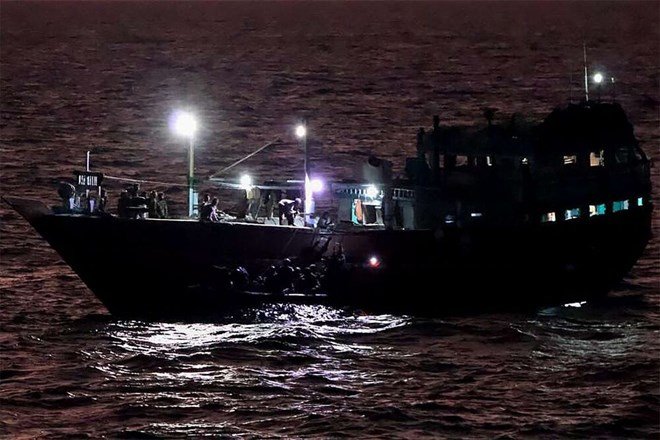Friday 20,Dec,2024 {HMC} Somali pirates who hijacked a Chinese-owned fishing vessel in late November off the coast of Puntland have escalated their ransom demand to $10 million, citing the ship’s alleged illegal fishing activities in Somali waters. The 18-member crew remains unharmed, but the incident has reignited concerns about the resurgence of piracy in the region.
The hijacking occurred near the Hafun district, a coastal area in northeastern Somalia, with reports indicating that local security guards hired to protect the vessel betrayed the crew and sided with the pirates.
The heavily armed captors, equipped with AK-47s and machine guns, have kept the ship moving along the coast to avoid detection by Puntland’s coastguards and international naval forces.
Efforts to negotiate the release of a hijacked Chinese fishing vessel have hit an impasse, and talks to secure the crew’s release have so far failed. Initial offers of $300,000 and $1 million were rejected by the pirates, who increased their ransom demand after discovering that the vessel, reportedly registered in Taiwan, had been operating with an expired fishing license. Puntland authorities have taken a firm stance against paying the ransom, with a senior official stating, “Negotiation is not an option. We cannot allow piracy to thrive in our waters.”
The hijacking is part of a resurgence in Somali piracy, which had seen a significant decline after international naval patrols curtailed activity between 2008 and 2012. According to the European Union Naval Force (EUNAVFOR), Somali waters have witnessed 43 piracy-related incidents since November 2023, including 27 confirmed attacks. In response to the evolving security threats in the region, the European Council recently extended the mandate of Operation Atalanta, alongside the EU’s military training and civilian capacity-building missions in Somalia, until February 2027.
Maritime analysts attribute the uptick in piracy to reduced naval security following the removal of the Indian Ocean High-Risk Area designation in January 2023. Foreign fishing fleets exploiting Somali waters have also exacerbated tensions, depriving local communities of vital livelihoods and fueling resentment among coastal populations.
The hijacking of the Chinese vessel has placed China’s maritime interests in the spotlight. With its only overseas military base in Djibouti and a long-standing anti-piracy presence in the Gulf of Aden, Beijing faces growing challenges in safeguarding its economic assets in the region. China has not yet commented on the incident, but its navy has played a significant role in counter-piracy operations since 2008.
EUNAVFOR’s Operation Atalanta has classified the hijacking as an armed robbery at sea and continues to monitor the vessel while coordinating with Somali and Chinese authorities. However, the pirates’ ability to evade capture by frequently moving the ship underscores the persistent challenges in policing Somalia’s vast maritime domain.
The tactics used in this hijacking bear similarities to past incidents, including the March capture of the MV Abdullah, which was released after a $5 million ransom payment. Pirates have increasingly turned to using hijacked vessels as mobile bases, enabling them to strike farther offshore.
In November 2024, two Somali pirates, Abdi Yusef Hassan and Mohamed Tahlil Mohamed, were each sentenced to 30 years in U.S. federal prison for their roles in the 977-day hostage-taking of American journalist Michael Scott Moore. The case highlighted the growing trend of holding pirates accountable through foreign legal systems, signalling to criminal networks that impunity is no longer guaranteed.
Experts warn that paying ransoms could encourage more attacks, perpetuating a cycle that threatens regional stability and global shipping routes. “The resurgence of piracy is not just a Somali problem; it’s a global maritime security challenge,” said a maritime security analyst.



